What am I going to learn in history?
Year 1 – Kings, Queens and Leaders
This ‘Kings, Queens & Leaders’ unit provides the foundation for understanding the changing power of the monarchy in Britain. It will explore how the power that kings and queens hold has changed over time, from the all-powerful monarchs who could dictate how the country was run and managed, to the establishment of parliament which created a check on the power of the King or Queen. This unit supports children’s understanding of the past, focusing first on changes within living memory of the present-day monarch (HRH Charles III) and the coronation of his mother, Queen Elizabeth II, before exploring the lives of other kings and leaders chronologically. The children will be introduced to significant national events that took place across this time period, such as Simon de Montfort’s first parliament, and the sealing of the Magna Carta by King John in 1215.
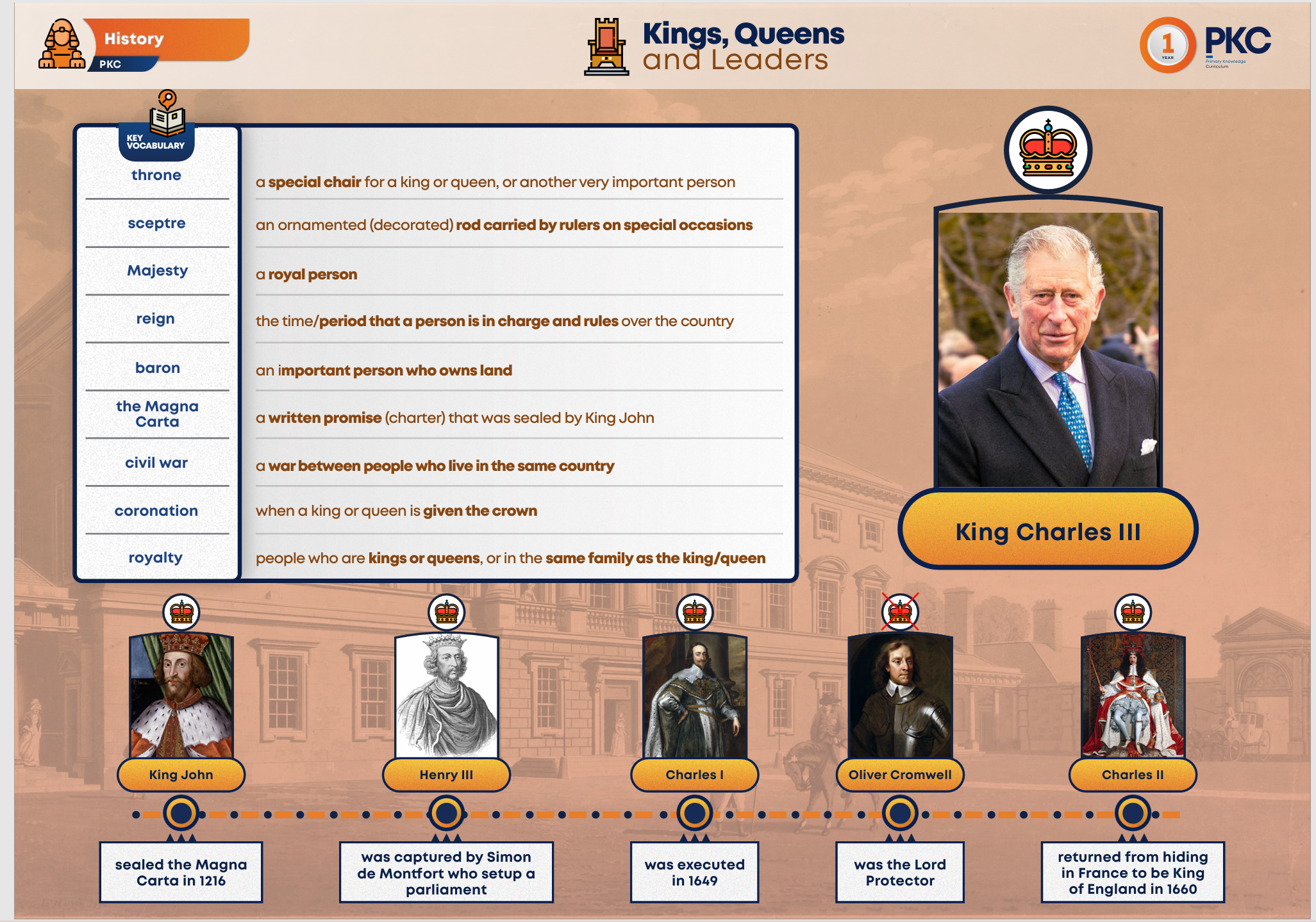
![]()
Year 2 - The Tudors
This unit provides children with an introduction to the Tudor monarchs. Building on from the Y1 Kings, Queens & Leaders unit, this unit aims to deepen pupils’ understanding of how Britain in the past was ruled. The pupils will learn that powerful dynasties, where power was inherited and passed down through generations predominately through the male line, ruled over Britain. This unit focuses on the lives of Henry VIII and his three children: Mary I, Elizabeth I and Edward VI. All three of Henry VIII children ruled over Britain at various points. Throughout the unit, the children will look at the Tudor family tree and learn about each monarch and look at how they sought to shape England during their reigns. During the unit, the children will be supported to use real historical sources. A key substantive concept covered in this unit is religion. Through storytelling, the children learn about the English Reformation and learn about some of the religious changes that took place during the Tudor period. The pupils will look at how the monarchy and ruling classes imposed religious beliefs on the people, often by force, and how religious tolerance and freedom of belief did not exist at that time. This provides a foundation for understanding religious conflict and persecution. Although a lot of focus in this unit is on the achievements and significance of the monarchy, and the religious and political decisions of the ruling classes, this unit also examines social history and delves into the lives of ordinary people during this period. The unit begins by looking at life in Tudor England, allowing children to compare and contrast life between the rich and poor, and between men and women. This is a theme which is explored across the curriculum and aims to inspire children to discuss social inequality and discrimination.
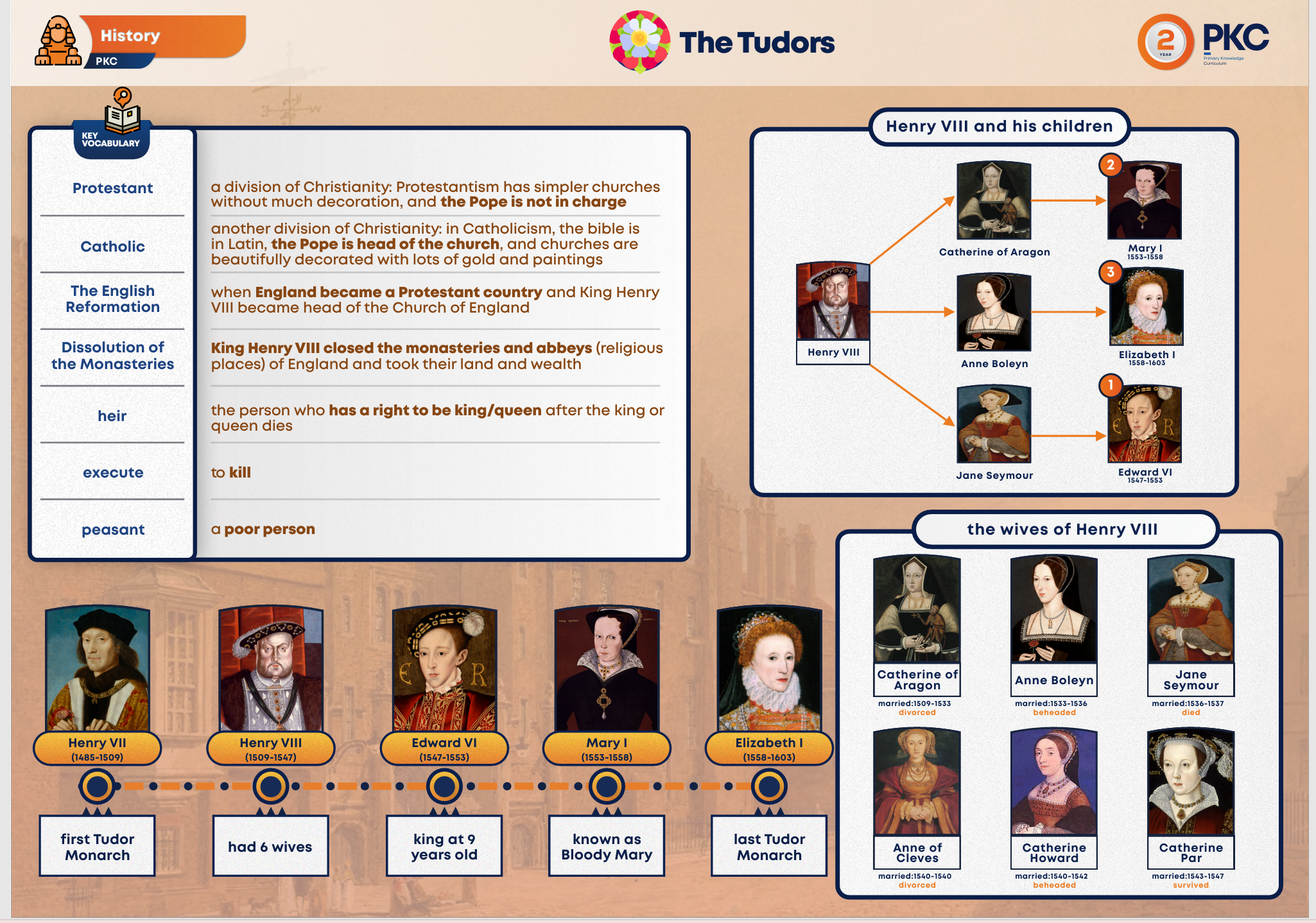
![]()
Year 3 – Ancient Egypt
This unit focuses on Ancient Egypt and follows on from The Stone Age to the Iron Age. These units cover some of the same time periods, which should allow children to make comparisons between what was happening in Egypt and Britain at the same point in time (for example, hieroglyphics were used in Egypt from c.3100 BCE, while there was no equivalent writing system in Britain until the Roman invasion in 43 CE) If possible, this unit is best taught before Ancient Greece and Ancient Rome, which both came after Ancient Egyptian civilisation. During this unit, the children will begin by locating Egypt and looking at the importance of the River Nile. The children will also learn about settlements and rivers in Geography this year. During this unit, the children will look at Ancient Egypt’s hierarchal society at this time. Children will look at social pyramids and be introduced to the terminology – slaves, Viziers, Craftsmen/Artisans, and Pharaoh. They will also learn about what it would be like to live in Egypt at this time by looking at how archaeologists have been able to find out about the food they ate, the clothes they wore, the houses they lived in and the jobs they did. The children will learn about the similarities and differences between the lives of the rich and the poor, and the lives of men and women at this time. This unit will also focus on fascinating Ancient Egyptian religious beliefs. The children will look at Egyptian beliefs regarding the afterlife and will look at the artefacts found in the tombs of both a craftsman and his wife, as well as one of the most well-known pharaohs – Tutankhamun. This unit will focus on how archaeological discoveries, such as Howard Carter's discovery of Tutankhamun’s tomb and the discovery of the Rosetta Stone, have enabled us to learn more about life in Ancient Egypt. This unit will focus on the key substantive concepts of civilisation, society, power and religion, and help children develop a sense of chronology and appreciation of the ancient world.
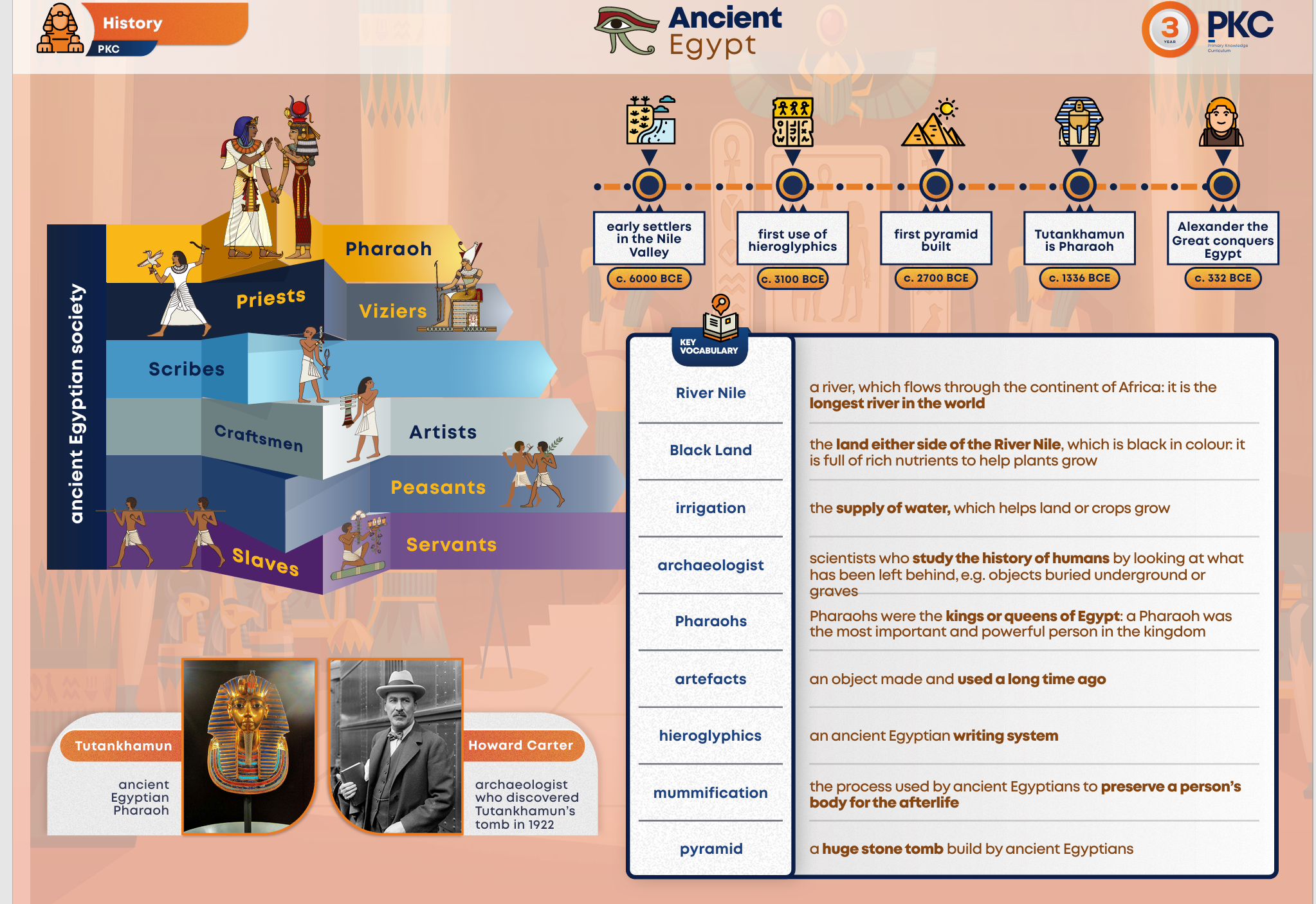
Year 4 – The Rise and Fall of Rome
This unit will help children to understand how power and influence were important to the success of the Roman Empire, but ultimately, how the struggle for power led to the fall of the Empire. Children will explore concepts such as empire, civilisation, conflict, and religion in this unit. The unit begins by looking at the Punic Wars, three major wars fought over 118 years between the Romans and the Carthaginians. Children will learn about the significant historical figure Hannibal, and will learn that he is thought to have taken elephants across the Alps to attack Rome. They will learn that after being victorious in the third Punic War, the Roman Empire gained power and influence and was able to spread. The children will also learn about the historically significant Julius Caesar, including his life and his assassination. They will learn the phrase ‘crossing the Rubicon’ and will understand that Julius Caesar led his armies across the Rubicon River, making a decision to attack Rome and committing a crime that he could never undo. Children will learn the significance of this military decision. This unit explains what led to Caesar’s assassination by senators who conspired to kill him to stop his reign as ‘dictator for life’, and the impact of this. This story helps children to understand how power was distributed, and fought for, in Rome. This unit moves on to exploring the Pax Romana. Finally, the unit explores the reasons for the fall of the Roman Empire, including power struggles, invasions, civil war and the exile of Romulus Augustus, the last Roman emperor.
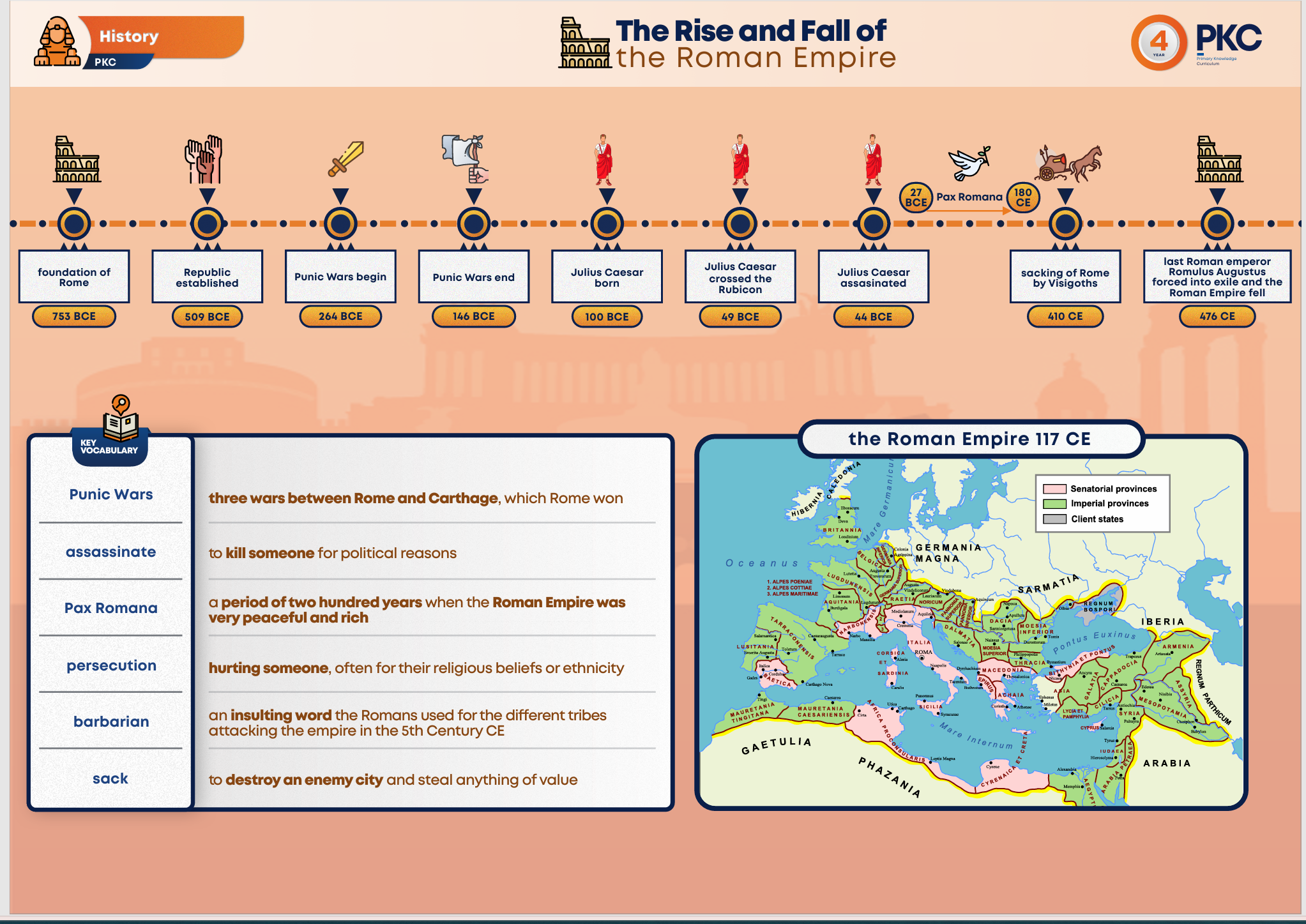
Year 5 - The Transatlantic Slave Trade
During this unit, the children will build upon their knowledge of empire and slavery. They will look at the atrocities of the Transatlantic Slave Trade, looking at how and why the forced migration of millions of Africans took place. The children will also learn about African resistance and will look at the Haitian Revolution, which was influenced by the French Revolution. The children will learn about the abolition of slavery. Prominent abolitionists will be studied, which might include Elizabeth Heyrick, Thomas Clarkson, William Wilberforce and Olaudah Equiano. The children will learn about the tactics used by the abolitionists to raise awareness of the atrocities of the slave trade back in Britain. The final lesson looks in detail at a prominent abolitionist. This unit will enable children to build upon their knowledge of Africa, and North and South America. They will be able to use their knowledge of resistance and revolts from their knowledge of the French Revolution, and they will look at the role of the Empire and the Transatlantic Slave Trade when they go on to learn about the Industrial Revolution and Victorian Britain.
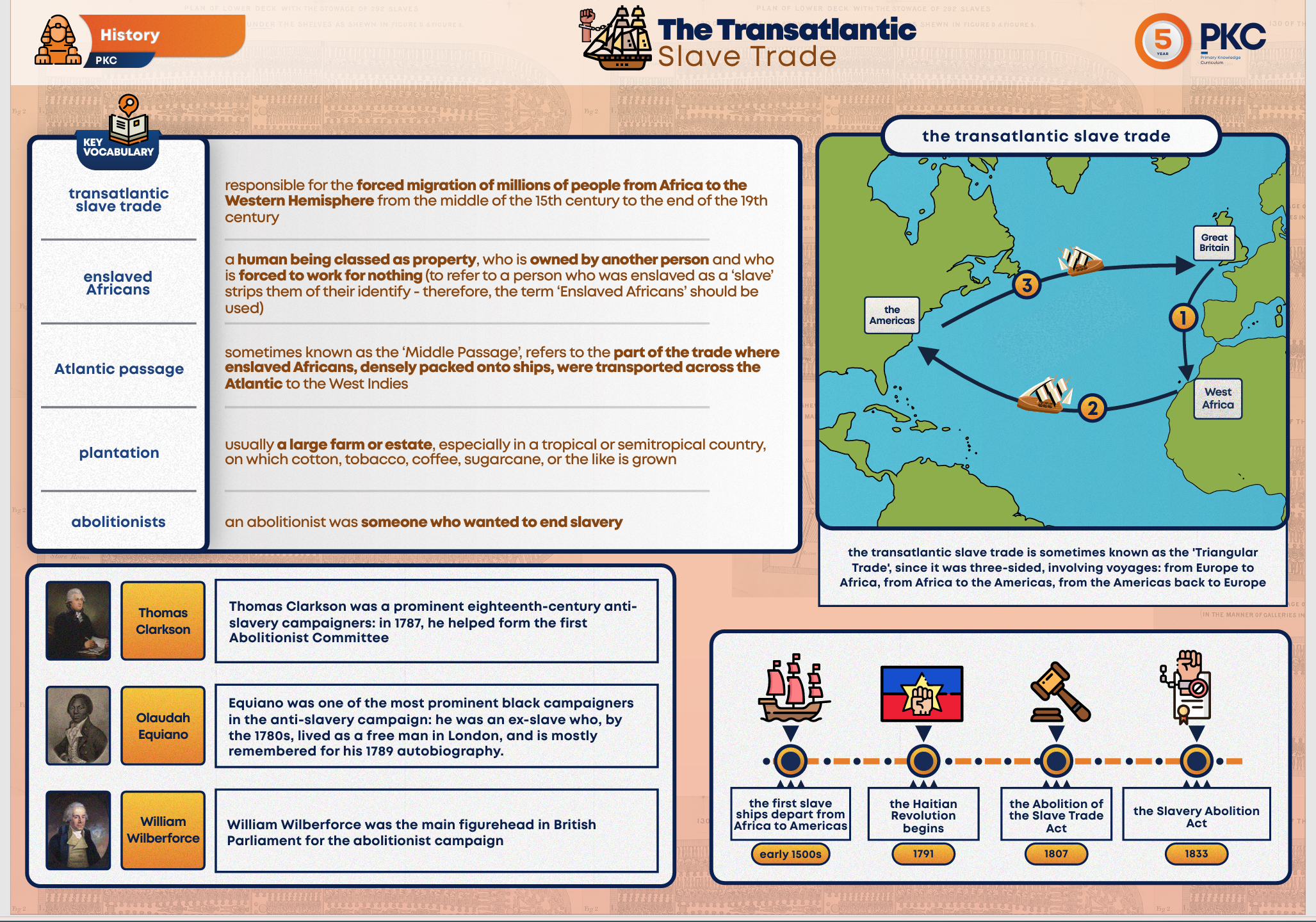
Year 6 - The Suffragettes
This unit begins by looking at democracy in Britain up until the 19th century. The children have previously learnt about British democracy, including the role of Parliament and prime ministers. Across the curriculum, they have learnt about the changing power of the British monarchy and the rise of Parliament. However, in this unit, the children are taught about the realities of democracy in Britain at this time, which they can compare with their knowledge of democracy today. Although Britain no longer had an absolute monarch, Parliament did not reflect the views of all people, or even a large majority of the population, as only the wealthy could vote. The children will learn about how and why the vote was extended to include more men, and how there were some people who believed that some women should also have the right to vote on the same terms as men. The children will learn about and compare the campaigns of the National Union of Women's Suffrage Societies, led by Millicent Fawcett and the Women’s Social and Political Union, led by Emmeline Pankhurst. The children have previously looked at political campaigns regarding the abolition of slavery. The children will also focus on the anti-suffrage movement and the reasons why people were opposed to allowing women to vote, including Queen Victoria. During this unit, children will be encouraged to use a range of primary sources to learn more about the thoughts, beliefs and experiences of people at the time. Children will be encouraged to analyse the similarities and differences between different perspectives at the time.
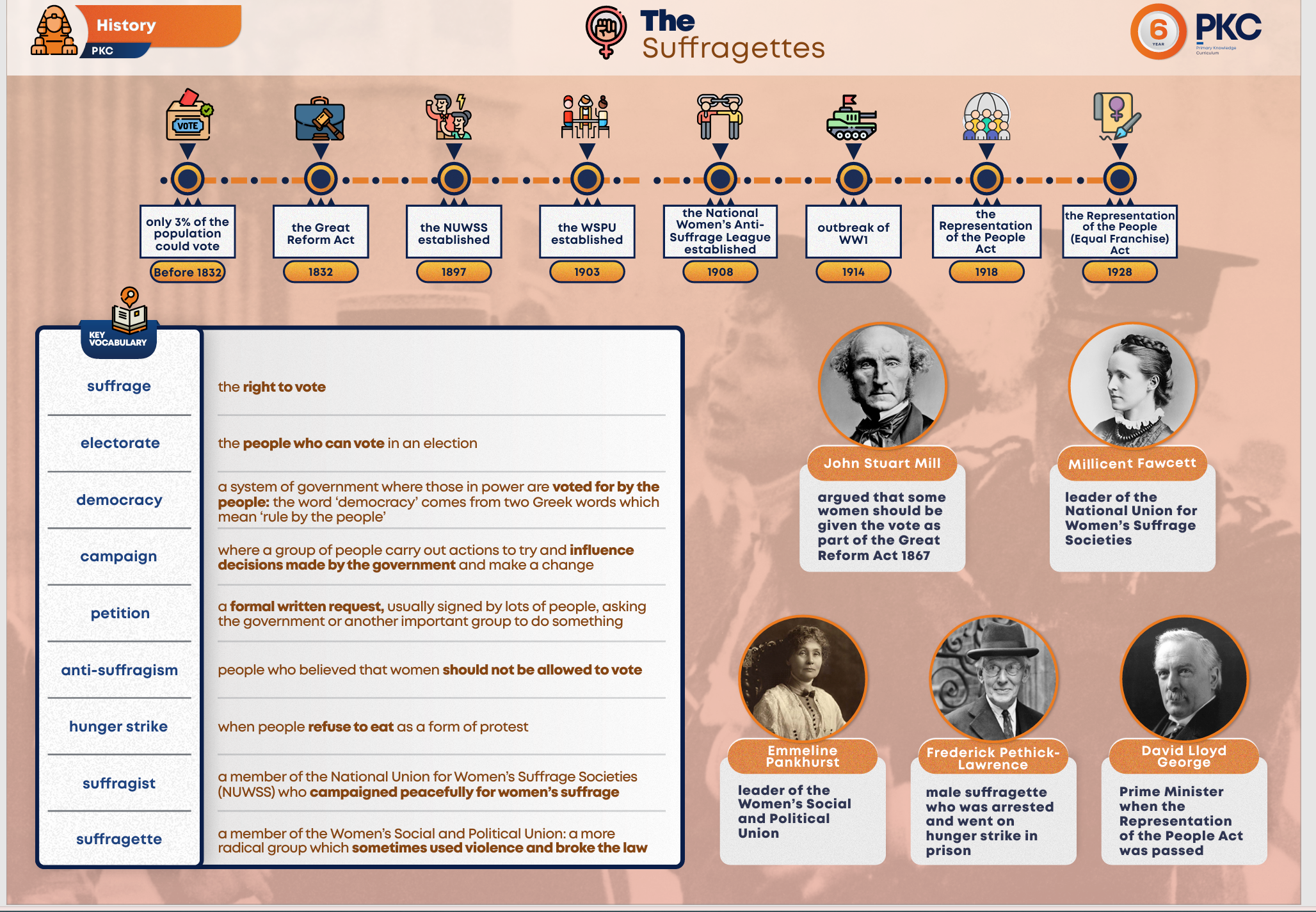
![]()
![]()
![]()
